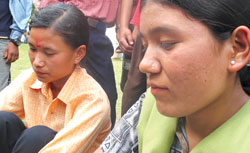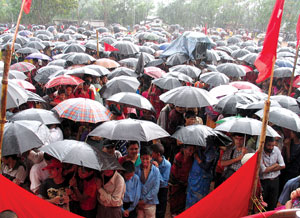|
|
| WOMEN IN THE FOREFRONT: More women have joined the armed struggle in the last few years. |
Under the sweltering heat of early summer sun at a Maoist meeting in Dhading Besi, Bima Waiba, 19, tells her story.
She became a Maoist at 14 and for the last five years she has been with the rebel's cultural group, Junu Silpa Cultural Company. She lives with her platoon and her work is to spread the message against western capitalist culture, oppression and exploitation of women. "Changing mentality takes time, our war is not over," Waiba says with surprising vehemence.
About 1,000 people had gathered at the Tundikhel here for a public meeting called by the Maoists on Saturday. Young and old applauded revolutionary songs, danced with the dancers and listened to Maoists leaders speak. Meetings like these are part of a Maoist effort to explain their position after the ceasefire, and as elsewhere it is difficult to tell whether the people are here of their own free will. The intention appears to be two-fold: to warn the parties not to backtrack on the 12-point agreement but, more importantly, to talk tough to their own cadre.
Indeed, the rhetoric is graphic and straight out of the Maoist manual, with speaker after speaker promising to "fight oppression until the last drop of blood flows in the veins".
Waiba herself seems to take her job very seriously. She explains how the revolutionary songs her group writes and performs are a source of empowerment to village women. "We are women guerrillas, we light a candle in our hearts and cross the oceans," she sings, "we are walking for people's liberation, we can play hide-and-seek with guns and we are ever ready to bomb the camps of our enemies."
The Maoist leadership claims that women make up more than 40 percent of the cadre base. Prachanda has admitted that over the years the movement was overwhelmed by the unexpected response of women to join the armed struggle. Proof of growing women guerrillas can also be estimated by the increasing number of women casualties on the Maoist side during crossfire.
|
|
| Bima Wiba and Kamala Dung of Junu Silpa Cultural Compay say the movement has empowered them to demand their rights. |
"I have to admit I did not know much about the party's ideology when I joined as a 15-year-old, but as a woman and as a victim of oppression, I could relate to and was encouraged by it," says Kamala Dung, 20 from Kabre. She then turns to a visiting reporter and asks: "You are a woman too, do you think our society is gender sensitive? Some people may be fine with doing nothing but I couldn't sit idly by."
Other comrades think it is the achievement of women in the movement that has motivated many to join the ranks. "Our society did not even trust women to go out of the four walls of the kitchen, when women took guns they scoffed," says Bimala Subedi of the Maoist student wing in Nuwakot, "now women are leading, they hold high positions and the movement has given them the opportunity to use their leadership skills."
She adds that the movement has most importantly taught them to ask for their rights including financial and property rights. Because of their programs many people in their villages have started thinking critically and questioning old values. "When I go home, I see a change in the way society looks at me and I know it is because of the movement that people's mindset is changing," says Waiba.
|
|
| Torrential pre-monsoon rain does not discourage those attending a Maoist assembly in Dhading on Saturday. |
Women comrades say that the male-female relationship between party members is equal. "Women who felt suffocated by discrimination in society feel like they have finally found their true identity within the party," says Subedi.
With their burnished faces the women look battle-hardened, but also war weary and relieved that the ceasefire is in place. But they also feel the work of making Nepali women stronger needs to go on.
The Maoist women's wing says it is now planning to push citizenship by mother's name, property rights to women, ending child marriage, banning polygamy, and introducing laws relating to abuse and domestic violence. They say lobbying by gender activists after 1990 haven't produced enough results. "We start these programs from places where our government is working and then we will take it all over the nation," says Subedi.
The speeches go on at the public meeting, the wind picks up and soon the rain comes down in torrents. Parbati Kandel of Balkot keeps on speaking without a microphone. She was arrested in 2005 from Nuwakot and released last month, she says after torture. "I can't just quit because I was beaten up," she says, "our movement continues and I am ready to give up my normal life to make the lives of Nepali women better."





